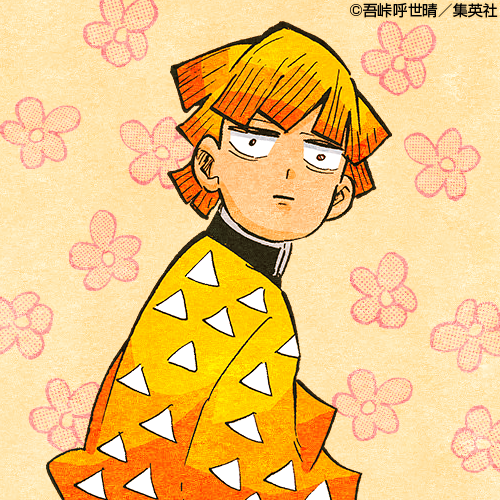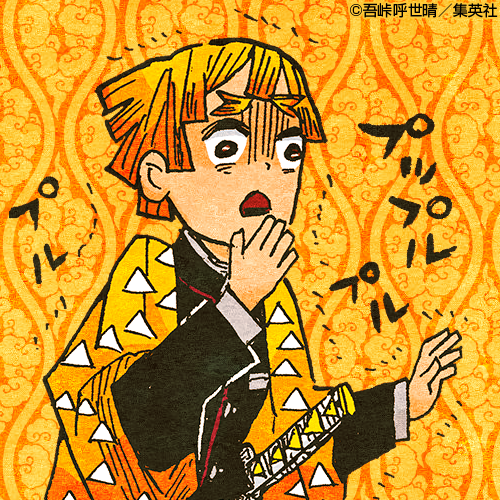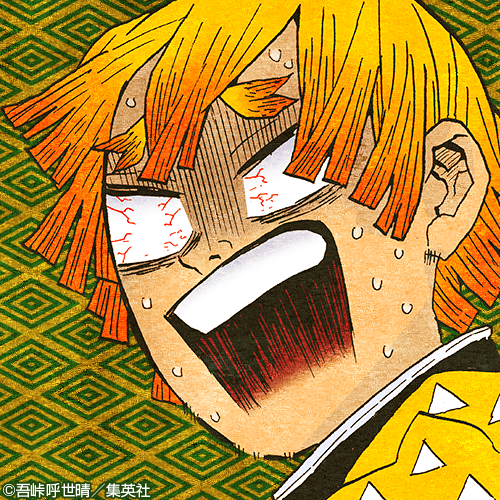はい、みなさん こんにちは!Welcome to Sakura Neko’s Japanese Study Room, where you can learn Japanese from anime quotes! In this article, I will introduce some memorable quotes from Episode 2 of Demon Slayer – Entertainment District Arc (Season 2).
In this episode, Tanjiro, Inosuke and Zenitsu goes to 遊郭 (yūkaku), the Entertainment District with Sound Hashira, Tengen Uzui (音柱 宇髄天元).
The English translation for each quote is from anime, and as you know, they are not necessarily the direct translation of the Japanese quote. Therefore, I put some explanation for each quote that can hopefully aid your understanding.
Quotes by Uzui Tengen
いいか、俺は神だ。お前らはゴミだ。
iika. ore wa kami da. omaera wa gomi da.
Listen up. I am a god. You three are trash.
「いいか」is used to get listeners’ attention before you explain something. The polite variation would be 「いいですか」. These phrases can sound quite pushy as they are used in a similar way as ‘Can’t you see? / Don’t you understand?’
俺 (ore): I
神 (kami): god
お前ら (omae ra): Plural version of お前 (omae), which is ‘you’
ゴミ (gomi): trash
俺が犬になれと言ったら犬になり、猿になれと言ったら猿になれ。
ore ga inu ni nare to ittara inu ni nari, saru ni nare to ittara saru ni nare
You are to turn into dogs if I tell you to, and turn into monkeys if I say so!
The verb stem (なり in the middle of this sentence) can be used to connect 2 sentences – so this sentence can be broken into 2 shorter sentences.
俺が犬になれと言ったら犬になれ Turn into dogs if I say so.
猿になれと言ったら猿になれ Turn into monkeys if I say so.

Xに なれ (nare): The imperative form of なる (naru), which means ‘to become’
Verbたら + Consequence: If I did X, then [consequence]
犬 (inu): dongs
言う (iu): to say
猿 (saru): monkeys
全身全霊でへつらうのだ!
zenshin senrei de hetsurau noda
Suck up to me with every fibre of your being!
You can use「のだ」(and 「んだ」) for commands. As for the difference between this form and a simple imperative form, check this article on Tofugu.
全身全霊 (zenshin zenrei): complete devotion
へつらう (hetsurau): to flatter, to suck up to
お前にはまだ早い!
omae niwa mada hayai
You are too young for this.
「まだ早い」means ‘too early’. So, the actual translation would be more like ‘To you, it’s too early.’
本当にダメだな、お前ら。
hontou ni dame dana. omae ra.
You guys are beyond hopeless.
「ダメ」can be used in some different ways. It can simply mean ‘no good’.
Ex. この靴はもうだめだ。 These shoes are no good anymore. (as in worn out)
It can also be used when one is decline someone else’s request
Ex. このジュースをのんでもいいですか。 Can I drink this juice?
ダメです。 No.
You can also use this word when someone or something is not achieving or serving its purpose.
Quotes by Zenitsu Agatsuma

やべぇやつだ。
yabee yatsu da.
This guy is crazy.
「やべぇ」is a variant of 「やばい」, which is a very versatile word in Japanese. Originally, it means ‘dangerous’ or ‘risky’, it can also be used in a similar way as English ‘shoot’, ‘shit’, ‘damn’ etc. Additionally, many young people use this word when they are excited or happy, in a similar way as English “awesome!”.
やつ (yatsu): fellow
とんでもねぇやつだ。
tondemonee yatsu da.
I don’t believe this guy.
「うんでもない」means ‘unthinkable’, ‘impossible’ or ‘unexpected’.
あんたとどっこいどっこいだろ!
anta to dokkoi dokkoi daro
You two are a close match for each other.
「どっこいどっこい」is an expression that means ‘about the same’
とんでもねえ話だ!
tondemonē hanashi da
This is outrageous!

「話」can mean lots of things: ‘talk’, ‘speech’, ‘discussion’ etc. You can translate this phrase as ‘this conversion / what he is saying is outrageous’.
ふざけないでいただきたい!
fuzakenaide itadaki tai.
I thank you not to mess with us.
「ふざける」means ‘to joke’ or ‘to make fun of’. Its negative imperative form 「ふざけるな」(Stop messing around, Stop kidding. )is often used to express one’s frustration. As Tengen is Zenitsu’s superior, he tries to use polite language even while he expresses his frustration, using 「〜ていただきたい」instead of 「ください」.
そういう妄想をしていらっしゃるんでしょ。
souiu mousou o shite irassharun desho
I suppose that’s what you fantasise.
「そういう」is ‘such’ or ‘like that’, and「妄想」means ‘fantasy’.
「していらっしゃる」is a polite version of 「している」(= is doing)






Comments